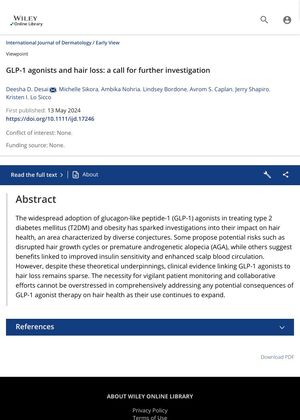GLP-1 Agonists and Hair Loss: A Call for Further Investigation
May 2024
in “
International Journal of Dermatology
”

TLDR More research is needed to understand if GLP-1 agonists affect hair health.
The document discusses the potential impact of GLP-1 agonists, commonly used for treating type 2 diabetes and obesity, on hair health. While some theories suggest these drugs might disrupt hair growth cycles or cause premature androgenetic alopecia, others propose benefits like improved insulin sensitivity and better scalp blood circulation. However, clinical evidence connecting GLP-1 agonists to hair loss is limited. The document emphasizes the need for careful patient monitoring and further research to fully understand the effects of GLP-1 agonists on hair health.





